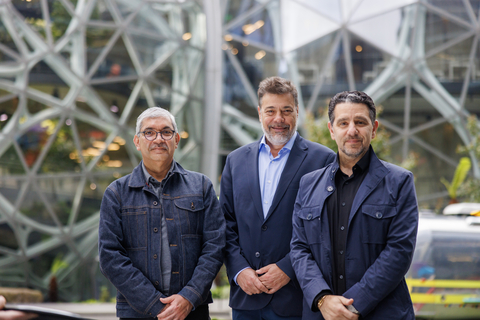Vrio to Offer Project Kuiper Satellite Broadband in 7 South American Countries to Help Bridge the Digital Divide
Vrio , parent company of DIRECTV Latin America and Sky Brasil, has partnered with Amazon's Project Kuiper to bring satellite broadband to seven South American countries: Argentina, Brazil, Chile, Uruguay, Peru, Ecuador, and Colombia.
This agreement aims to provide affordable, high-speed internet to unserved and underserved communities, benefiting an estimated 200 million people who currently lack connectivity.
The collaboration leverages Project Kuiper's low-latency, high-bandwidth satellite network, offering nationwide coverage without the need for extensive infrastructure. Initial service demonstrations are expected to begin later this year.
- Vrio's partnership with Amazon's Project Kuiper will provide affordable, high-speed internet to underserved communities.
- The project targets approximately 200 million people without internet access in seven South American countries.
- Project Kuiper's low-latency, high-bandwidth satellite network ensures fast and reliable internet connectivity.
- Nationwide coverage without the need for extensive infrastructure like fiber optics or fixed wireless systems.
- Service demonstrations are expected to start later this year, showcasing the project's feasibility and readiness.
- The project relies heavily on the successful deployment of Project Kuiper's satellite constellation.
- Potential regulatory hurdles in each country could delay implementation.
- Initial service demonstrations may not cover all planned areas, leading to slower rollout.
Insights
Market Impact: The announcement of Vrio's collaboration with Amazon's Project Kuiper has significant implications for the South American internet service market. By leveraging low Earth orbit (LEO) satellites, Vrio can bypass the challenges of traditional infrastructure, offering competitive and affordable internet access. This could disrupt existing providers and create new market dynamics, especially in underserved areas.
Competitive Landscape: Traditional ISP's reliance on ground infrastructure, such as fiber optics, is costly and geographically limited. Vrio's satellite-based service can rapidly scale, offering nationwide coverage. This partnership positions Vrio as a formidable player in the broadband market, potentially capturing a significant share in regions where competition is limited.
Long-Term Potential: In the long run, this initiative can transform digital connectivity in South America, fostering economic growth and digital inclusion. Industries like e-commerce, remote work and online education will likely see substantial benefits, driving overall consumption and regional economic development.
Revenue Streams: This deal can significantly boost Vrio's revenue. By targeting unserved and underserved areas, Vrio taps into a massive, untapped market. The operational expenses of satellite broadband are relatively lower after initial deployment, promising high margins.
Investment Perspective: For investors, this partnership offers a robust growth story. The scalability of satellite internet can lead to a rapid increase in customer base, translating to higher revenues and potentially stronger financial performance. However, investors should be cautious about initial deployment costs and regulatory hurdles.
Risk Factors: Despite the promising outlook, there are risks. The success of Project Kuiper's full deployment is important and any delays or technical issues could impact service roll-out and revenue realization. Moreover, local regulatory environments across different countries could pose challenges.
Technology Impact: The use of LEO satellites by Project Kuiper represents a significant technological advancement over traditional geostationary satellites. LEO satellites offer lower latency and higher bandwidth, making them suitable for modern internet applications like video streaming and online gaming. This can drastically improve user experience compared to existing satellite internet services.
Innovation Potential: Vrio's use of Project Kuiper's network could serve as a test case for the viability of satellite internet in other global regions. Successful implementation in South America could pave the way for similar initiatives worldwide, elevating Amazon's and Vrio's status as pioneers in this field.
Vrio companies DIRECTV Latin America and Sky Brasil will use Amazon’s satellite broadband network to make internet connectivity available for unserved and underserved communities

Outside Amazon headquarters in downtown
Vrio plans to use Project Kuiper’s network to provide connectivity services to residential customers in
DIRECTV and Sky will use Project Kuiper's low-latency, high-bandwidth satellite network to bring the benefits of fast and reliable internet to areas that would otherwise be both challenging and prohibitively expensive to serve. With Project Kuiper, the companies will offer nationwide coverage in each country—something that is not practical with traditional connectivity options like fiber optics or fixed wireless that require extensive infrastructure.
Darío Werthein, president of Vrio Corp., stated: "This collaboration with Project Kuiper is in line with our strategy of extending our services throughout
“Project Kuiper is a powerful opportunity to make a difference in people’s lives,” said Panos Panay, Amazon’s senior vice president for devices and services. “There are hundreds of millions of households around the world that don’t have access to reliable broadband internet, which means they can’t take part in things that we can take for granted, like being able to learn online, run a business online, shop, or enjoy streaming entertainment. Working with Vrio to bring affordable access to broadband means we can enable so many more people to create, connect, and learn in new ways.”
"Project Kuiper’s mission is to deliver fast, affordable broadband to areas that have traditionally been difficult to reach,” said Rajeev Badyal, vice president of technology and head of Project Kuiper at Amazon. "Our network has the capacity and flexibility to serve tens of millions of customers around the world, and this distribution agreement with Vrio is part of our commitment to working with regional providers who share that vision. We look forward to working with Vrio to serve customers across South America.”
Project Kuiper recently tested two prototype satellites as part of its successful Protoflight mission. It expects to begin deploying its satellite constellation in the coming months, and to start service demonstrations with Vrio and other select customers later this year.
For more information on Project Kuiper, visit https://www.aboutamazon.com/projectkuiper.
About Vrio Corp.
Vrio Corp. is a leading American media and technology company in
About Amazon
Amazon is guided by four principles: customer obsession rather than competitor focus, passion for invention, commitment to operational excellence, and long-term thinking. Amazon strives to be Earth’s Most Customer-Centric Company, Earth’s Best Employer, and Earth’s Safest Place to Work. Customer reviews, 1-Click shopping, personalized recommendations, Prime, Fulfillment by Amazon, AWS, Kindle Direct Publishing, Kindle, Career Choice, Fire tablets, Fire TV, Amazon Echo, Alexa, Just Walk Out technology, Amazon Studios, and The Climate Pledge are some of the things pioneered by Amazon. For more information, visit amazon.com/about and follow @AmazonNews.
About Project Kuiper
Project Kuiper is Amazon’s low Earth orbit satellite broadband network. Its mission is to provide fast, affordable broadband connectivity to tens of millions of customers living in unserved and underserved communities around the world. Project Kuiper is building its network with the capacity, flexibility, and performance to also serve a wide range of enterprise, telecommunications, and public sector customers who need secure end-to-end connectivity services for their people, facilities, and equipment. To achieve its goals, Project Kuiper is deploying thousands of satellites to low Earth orbit—connected to each other by high-speed optical links that will create a mesh network in space—and linked to a global network of antennas, fiber, and internet connection points on the ground. Following a
View source version on businesswire.com: https://www.businesswire.com/news/home/20240613221984/en/
Amazon.com, Inc.
Media Hotline
Amazon-pr@amazon.com
www.amazon.com/pr
Source: Amazon.com, Inc.







